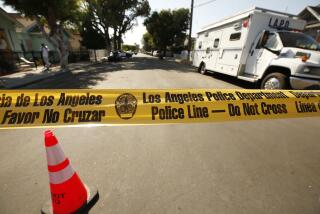Hong Kong arrests 10 in suspected bomb plot
- Share via
Reporting from Hong Kong — Hong Kong police arrested 10 people Sunday and Monday suspected of conspiring to manufacture explosives in this semiautonomous Chinese territory. News of the bomb plot comes before a highly anticipated vote in the territory’s legislature this week on a contentious framework for Hong Kong’s next major election.
Acting late Sunday night on a tip about suspicious activities at a vacant TV studio, officers said they found a cache of explosives and air rifles, along with maps marking a dynamite depot and two neighborhoods, including Admiralty, the seat of the legislature and government headquarters.
Despite reports in local media quoting unidentified police sources linking the possible bomb plot to the upcoming vote, police said at a news conference that they had uncovered no evidence of a connection.
“We won’t rule out any possibility,” said Au Chin-chan, chief superintendent of the police’s organized crime and triad bureau. Officers said the investigation was continuing. “We’re still trying to locate the depot,” Au said. “We may make more arrests later.”
Six men and four women were arrested, and at least one of them acknowledged being a member of a “local radical group,” police said.
Although police declined to identify the organization, local news media reported Monday night that all suspects hail from a little-known nascent group called “National Independent Party.”
The group’s Facebook page gives an email address registered in Switzerland and has garnered only 200 likes in five months, raising suspicions about the police description of the group.
Willy Lam, a political analyst based in Hong Kong, said more details about the arrests would need to be aired before conclusions could be drawn. But among intellectual and pro-democracy circles, he said, there has been significant discussion about whether Communist Party backers and supporters of current Chief Executive Leung Chun-ying might be working behind the scenes to “encourage some of these more radical people to act irrationally and then arrest them as a form of intimidation” against others who might want to peaceably demonstrate their views.
But Lam said there was no proof that the arrests were orchestrated in such a fashion.
“Some groups do want to air their grievances in a more passionate manner,” he said, and depending on how far they go it could be bad for the democracy movement if their tactics alienate more moderate residents.
The suspects included a post-secondary school student, a teaching assistant, a construction worker, a technician and three unemployed people, according to the South China Morning Post, citing an anonymous police source.
Police had warned last week that they were monitoring online forums of activist groups as the vote approached.
In the run-up to the vote, some pro-democracy groups have organized several days of protests around the main government complex, where tens of thousands of people massed last fall in unprecedented street demonstrations that lasted 10 weeks and seriously riled communist leaders in Beijing.
Those protests were aimed at a proposed framework drafted by authorities in Beijing for Hong Kong’s next election for chief executive. The former British colony returned to Chinese sovereignty in 1997 under an arrangement known as “one country, two systems.”
The election framework being voted on this week would, for the first time, allow Hong Kong citizens to cast ballots directly for the territory’s top leader, but would limit their choice to two or three candidates endorsed by a screening panel expected to be composed mainly of “pro-Beijing” members. (Until now, the chief executive has been chosen by a 1,200-member committee.)
For the framework to be implemented, Hong Kong’s Legislative Council must vote to adopt it, and a vote is expected this week. But a bloc of legislators known as the pan-democrats has vowed to block its passage.
Barring any last-minute surprises, it appears that the pan-democrats will have the numbers to vote down the election framework. But among supporters of last fall’s democracy protests, there is little jubilation surrounding that likely scenario.
The vote will simply ensure that the current system will remain in place, and little electoral reform is likely to be forthcoming for years, noted Jason Y. Ng, a Hong Kong author and attorney who is writing a book about the protests. “People feel damned if they do and damned if they don’t,” he said.
Times staff writer Makinen reported from Shanghai and special correspondent Law from Hong Kong.
More to Read
Sign up for Essential California
The most important California stories and recommendations in your inbox every morning.
You may occasionally receive promotional content from the Los Angeles Times.














